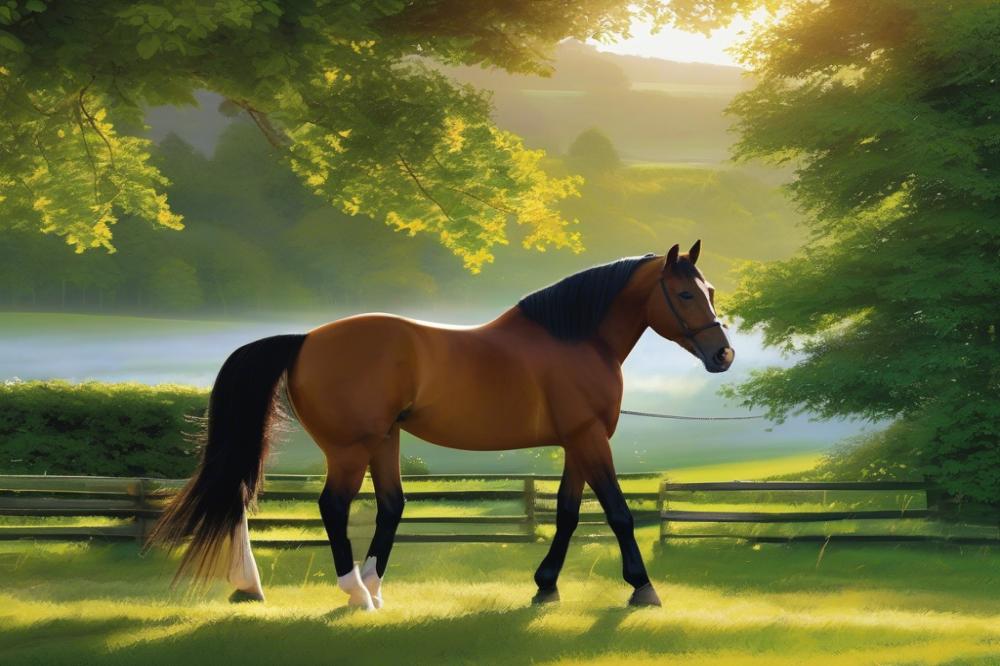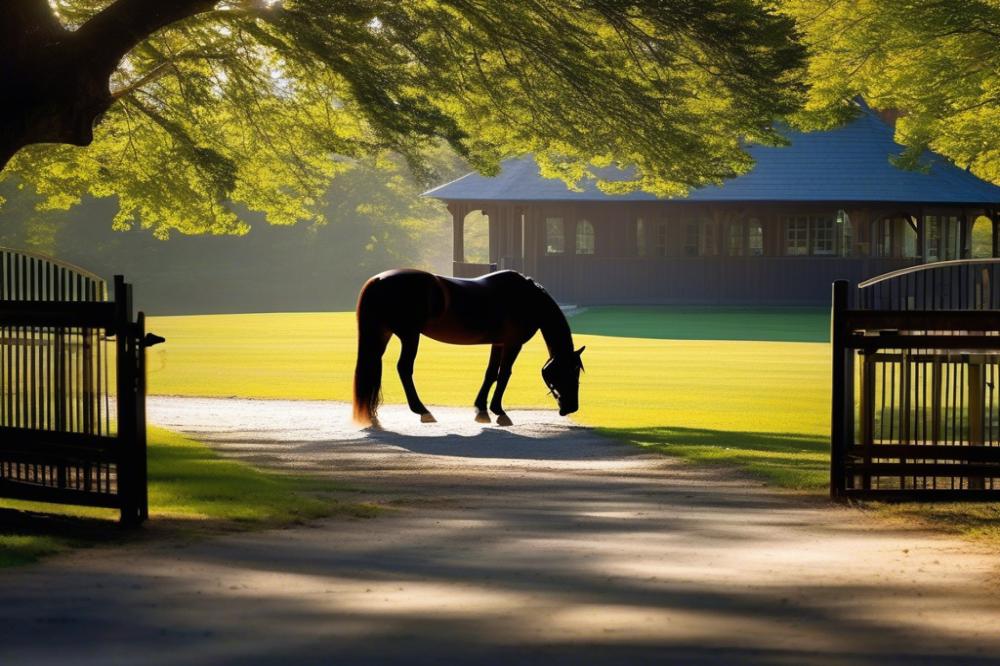The Joys and Challenges of owning a horse on Your Own Property
Caring for a horse is a rewarding yet complex endeavor. Many people dream about the freedom and companionship that comes with having a horse. A horse can become an integral part of your life, offering not just companionship but also a unique bond that can uplift your spirit.
Before diving into horse ownership, it is crucial to grasp both the joys and challenges involved. Caring for an animal of this size requires dedication and knowledge. First-time owners might be enchanted by the idea, yet they must also recognize the commitment involved. From managing day-to-day care to maintaining appropriate conditions on horse property, each aspect requires careful consideration.
Practical insights can shed light on what to expect. Creating a safe environment is key; fencing, shelter, and access to food and water are vital elements. Additionally, understanding the financial responsibilities is just as important. Veterinary care, feed, and equipment can quickly add up.
owning a horse brings immense joy and teaches valuable life lessons. With proper research and preparation, newcomers can navigate the obstacles effectively. Embracing this journey can lead to lasting friendships with both horse and fellow equestrians. Remember, knowledge is power, especially when embarking on such an exciting adventure.
Owning a Horse: An Overview

Horse ownership requires a significant commitment. Daily care is essential. Owners must provide regular feeding, grooming, and exercise. Cleaning stables and managing health is also necessary. This can be an exhausting routine, but the rewards are immense.
Building an emotional bond with a horse often becomes one of the most cherished aspects of ownership. Trust and companionship develop over time. Many riders find joy in the simple act of being with their horse. Something magical happens during those quiet moments spent together.
Having horses on your own property offers numerous benefits. First, convenience is a major factor. No more driving to a boarding facility for rides or care. Additionally, owners can set their own schedule, which allows for greater flexibility. The space can also serve as a retreat, a place to unwind and enjoy nature.
equine care and horsekeeping Essentials

Daily Care Routines for Horse Health
Taking care of a horse requires a consistent daily schedule. Each morning, you should check your horse for any signs of illness or injury. Grooming is not just about making them look good; it’s vital for their skin and overall health. Remove dirt and debris from their coat to prevent skin irritation. Hoof care is crucial, too. Clean their hooves daily to eliminate stones and dirt. This practice helps prevent infections and other hoof-related issues.
Feeding is another significant part of daily care. Horses thrive on routine. They benefit from being fed at the same time each day. Providing fresh water is equally important. This hydration helps maintain their overall health. A clean, safe environment is essential, as well. Check for any hazards in their stall or pasture.
Understanding Horse Feed and Nutrition
Nutrition plays a key role in your horse’s health. Different horses have different dietary needs based on age, activity level, and health. Quality hay should be the foundation of their diet. Look for hay that is free from mold or dust. Grain can be added, but it should not be the main component. Too much grain can lead to colic and other serious issues.
Supplementing with vitamins and minerals is also wise for some horses. Always consult with a veterinarian or an equine nutritionist before making changes to their diet. This advice can help tailor their nutrition to their specific needs.
Importance of Regular Veterinary Check-Ups
Regular veterinary check-ups are essential for maintaining a horse’s health. Schedule these visits at least once a year for basic vaccinations. Your veterinarian will also perform dental checks, which can uncover potential issues. Tooth problems can affect eating and overall well-being.
Familiarize yourself with common health concerns so you can spot them early. Regular deworming is critical to prevent parasites. Your vet will provide a plan based on your horse’s needs. Taking these proactive steps helps you avoid serious health problems in the long run. Keeping records of vaccinations and health issues can aid you during vet visits.
Horse care can be demanding but is deeply rewarding. Each moment spent ensures your horse lives a healthy, fulfilling life. A little effort goes a long way in building a strong bond with your equine companion.
Pasture Management and Fencing
Selecting Suitable Pasture for Your Horse
Finding the right pasture is crucial for a horse’s well-being. The land should provide plenty of grass and room to roam. Look for areas with good drainage and rich soil. Avoid pastures with toxic plants, as they can harm your horse. Test the soil to understand its nutrient levels. Your horse needs a balanced diet, and healthy grass plays a big role in that. Additionally, consider the climate of your area. Some grasses grow better in certain conditions. Choose plant species that are adaptable to local weather patterns.
Managing Grazing to Maintain Healthy Pastures
Grazing management is key to keeping the pasture in good shape. Overgrazing can destroy grass and lead to erosion. To combat this, rotate grazing areas. This means letting horses eat in one pasture while allowing another to recover. Proper rotation can help maintain healthy ground cover. Regularly check pasture health, watching for bare spots or weeds. These issues can indicate that management adjustments are needed. Keep your horse on a schedule that balances their needs with pasture care. Monitoring the weight of your horse also helps prevent overgrazing.
Types of Fencing and Their Importance for Safety
When it comes to fencing, safety is the top priority. Different types of fencing serve different needs. Wood fences are sturdy and traditional but require maintenance. Vinyl fences can offer a similar appearance with less upkeep. Electric fencing is effective for keeping horses contained but needs careful installation. Always check equipment regularly to prevent escapes. Choose a design that fits your property and budget. Clear boundaries keep your horse from wandering into dangerous areas or neighboring properties. Keeping your fencing strong and secure should be one of your main concerns.
Stable Maintenance and Riding Facilities
Key Elements of Stable Upkeep
Maintaining a stable requires regular attention to several key aspects. Cleanliness is essential. Daily mucking out stalls helps keep the environment healthy for your horse. Regular inspections of the structure can prevent costly repairs down the road. Check for loose boards or exposed nails that might cause injury. Adequate ventilation is also crucial. Proper airflow reduces odors and moisture accumulation.
Hygiene must not be overlooked. Disinfecting feeding areas and tack rooms minimizes the risk of disease. Bedding material should be fresh and dry. Wet or dirty bedding can lead to health issues for your horse. Keeping feed storage clean and secure prevents pests from becoming a problem. Regularly monitor stored hay for signs of mold.
Routine maintenance tasks cannot be neglected. Repair fencing to keep your horse safe. Regularly check water sources to ensure they are clean and flowing. A secure and inviting environment is vital for both you and your horse.
Creating Safe and Functional Riding Facilities
Setting up riding facilities is an exciting venture. Start with safe ground surfaces for your horse. Choose materials that provide good footing and wear well over time. Additionally, proper drainage is key to preventing muddy areas. An uneven riding surface can lead to slips and falls.
Space is important. Ensure the riding area offers ample room to move safely. Freely kicking or rearing improves your horse’s comfort and confidence. Surround the area with fencing to keep distractions at bay. Obstacles can enhance skills but should be designed with safety in mind.
Consider lighting for evening riding. Well-placed lights allow for enjoyment after sunset. Installing a secure storage area for tack and equipment enhances safety and organization. Having a designated space makes the experience smoother.
Considerations for Indoor and Outdoor Arenas
Both indoor and outdoor arenas have their own benefits and challenges. An indoor arena allows for year-round riding regardless of weather. However, it usually requires significant investment in construction and upkeep. Proper ventilation and lighting should be priorities in these structures. Maintaining cleanliness inside helps keep both the arena and horse healthy.
Outdoor arenas, on the other hand, can be more cost-effective to build. Natural light and fresh air offer a pleasant environment. Nevertheless, these arenas are subject to weather challenges. Rain creates muddy conditions that can make riding difficult. Building a solid base with good drainage will help lessen these problems.
Consider using different footing materials depending on the purpose. Sand and rubber mixes can offer excellent shock absorption and grip. Always keep safety at the forefront. Regular maintenance checks on the fencing and arena surface will provide peace of mind. Enjoying time with your horse in a well-planned facility enhances both interaction and riding pleasure.
Horse Training and Equestrian Lifestyle
Basics of horse training for first-time owners
Training a horse requires patience and consistency. New owners often start with groundwork, which helps to build trust. Teaching basic commands can create a strong foundation. Important skills include leading, stopping, and turning. Gradually, you can introduce riding. Focus on building a bond with your horse. Horses respond best to positive reinforcement. Consider enrolling in training classes if you feel uncertain. Professional trainers can provide guidance and valuable techniques.
Balancing leisure and training in your equestrian lifestyle
Leisure rides can be a rewarding part of ownership. Setting aside time for training is equally important. Creating a schedule helps balance both aspects. Enjoying the companionship of your horse makes everyday chores easier. Consider your horse’s needs as you plan activities. Weekends might be perfect for longer rides. Distributing training sessions throughout the week keeps your horse sharp. Moreover, enjoy the process and the connection you build together.
Community resources for support and learning
Local equestrian groups can be a rich source of information. Joining a club allows for camaraderie and shared experiences. Many communities offer workshops on various topics. Online forums can provide advice and tips from seasoned owners. Libraries often have resources dedicated to horse care and training methods. Attending local events helps in connecting with knowledgeable people. Networking with other horse owners can lead to new opportunities. Engaging with the community enhances your understanding and experience.
Challenges of Horse Ownership
Owning a horse brings joy, but it also comes with significant responsibilities. Commitment of time is one of the biggest hurdles for many horse owners. Daily care is essential. Feeding, grooming, and exercise can take hours. Therefore, lifestyle adjustments are necessary. Routines often shift to accommodate the needs of a horse.
Health issues can arise unexpectedly. Horses may suffer from hoof problems, colic, or other ailments. Managing these health concerns can be stressful. Emergencies may happen at any hour. Having a plan for veterinary care is imperative. Owners must remain vigilant for signs of sickness to act promptly.
Financial aspects can weigh heavily on one’s mind. Costs like feed, bedding, and veterinary care add up quickly. Additionally, expenses for equipment become evident. Maintenance of fencing, stables, and pastures also requires funding. Budgeting becomes crucial to provide for a horse’s needs adequately.
Dealing with these challenges requires dedication and patience. Every horse enthusiast must recognize their limits. Understanding the responsibilities helps prospective owners make informed decisions. Planning can mitigate some difficulties, but commitment remains essential. Horse ownership is not just a hobby; it’s a way of life.
Final Thoughts on the horsekeeping Journey
Recapping the joys and challenges of horse ownership reveals a rich tapestry of experiences. The thrill of watching a horse gallop freely, the peaceful moments spent grooming after a long day, and the unmatched bond formed between rider and horse all highlight the beauty of this journey. Yet, the responsibilities can be daunting. Daily feeding, regular vet visits, and consistent upkeep of facilities demand significant time and resources.
Prospective owners should carefully weigh their options before diving in. Consider the financial aspects, available space, and personal commitment. These factors can significantly impact the experience. A horse is not just a pet; it is a living being requiring dedication and passion.
Embracing the journey of caring for an equine can be immensely rewarding. Each challenge faced paves the way for growth and learning. Building a connection with such an animal can enrich one’s life in unimaginable ways. The relationship formed often brings joy that outweighs the difficulties. For those ready to take the leap, remember the importance of patience and enjoyment along the way. Celebrate every moment and cherish the lessons learned. Horsekeeping may hold its hardships, but the rewards are well worth it.



